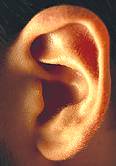- Could Your Grocery Store Meat Be Causing Recurring UTIs?
- Are You Making This Expensive Thermostat Error This Winter?
- Recognizing the Signs of Hypothyroidism
- 10 Strategies to Overcome Insomnia
- Could Artificial Sweeteners Be Aging the Brain Faster?
- Techniques for Soothing Your Nervous System
- Does the Water in Your House Smell Funny? Here’s Why
- Can a Daily Dose of Apple Cider Vinegar Actually Aid Weight Loss?
- 6 Health Beverages That Can Actually Spike Your Blood Sugar
- Treatment Options for Social Anxiety Disorder
Cochlear Implants May Also Boost Seniors’ Mood, Thinking: Study


Cochlear implants not only boost hearing in seniors with severe hearing loss, they might also enhance their emotional state and thinking abilities, a new study finds.
A cochlear implant is a small device that helps provide a sense of sound to people who are deaf or have significant hearing loss, according to the U.S. National Institute on Deafness and Other Communication Disorders.
This new study was funded by the makers of cochlear implants. It included 94 people, aged 65 to 85, who were assessed before, and then six and 12 months after, receiving an implant.
While the study couldn’t prove cause-and-effect, the cochlear implants were associated with improved speech perception in quiet and noisy settings, better quality of life, lower rates of depression and improved thinking skills, the researchers found.
“This study has tremendous implications,” said one expert, Dr. Ian Storper, director of otology at Lenox Hill Hospital in New York City. But he said questions remain.
“Can improvement of hearing loss improve our ability to think? How poor does the hearing have to be to benefit? Does the cause of the hearing loss matter? Does the cause or degree of the cognitive [mental] impairment matter? How long does it work for, if it does work?” said Storper, who was not involved in the new study.
“This study raises these questions by showing the improvement of cognition with remedy of hearing loss,” he said. “Further investigation will help answer the remaining questions.”
The research, published March 12 in the journal JAMA Otolaryngology-Head & Neck Surgery, was led by Dr. Isabelle Mosnier of Assistance Publique-Hopitaux de Paris, in France.
Her team also found that, besides enhancing hearing, the cochlear implant seemed to boost the emotional health of at least some of the seniors. The study found that the number of patients who were free of depression rose from 59 percent before receiving a cochlear implant, to 76 percent by one year after receiving the device.
Six months after the participants received their cochlear implants, there were also improvements in their average scores in all areas of thinking (cognitive) abilities. More than 80 percent of those with the lowest cognitive scores before receiving a cochlear implant showed improvement one year after implantation.
“Our study demonstrates that hearing rehabilitation using cochlear implants in the elderly is associated with improvements in impaired cognitive function,” the researchers wrote.
Another expert in the United States wasn’t surprised by the findings.
“It has become increasingly recognized that deafness in the elderly population can be misdiagnosed as cognitive dysfunction or even dementia,” said Dr. Eric Smouha, director of otology and neurology at Mount Sinai Hospital in New York City. He said the new findings have been replicated in prior studies conducted in the United States.
For this reason, patients with severe hearing loss “who are suitable candidates for cochlear implantation should not be denied surgery on the basis of age,” Smouha said. “If they are in good enough medical condition to undergo a 2-hour operation, properly selected patients can be expected to have good results, with improved communication and enhanced quality of life.”
According to the American Academy of Otolaryngology-Head and Neck Surgery, a cochlear implant can cost $100,000, including the device and surgery needed to implant it. However, insurance and/or Medicare typically covers this cost, the academy said.
The study was funded by Advanced Bionics AG, Cochlear France, Vibrant Medel Hearing Technology and Oticon Medical/Neurelec.
More information
The U.S. National Institute on Deafness and Other Communication Disorders has more about cochlear implants.
Source: HealthDay
Copyright © 2026 HealthDay. All rights reserved.










